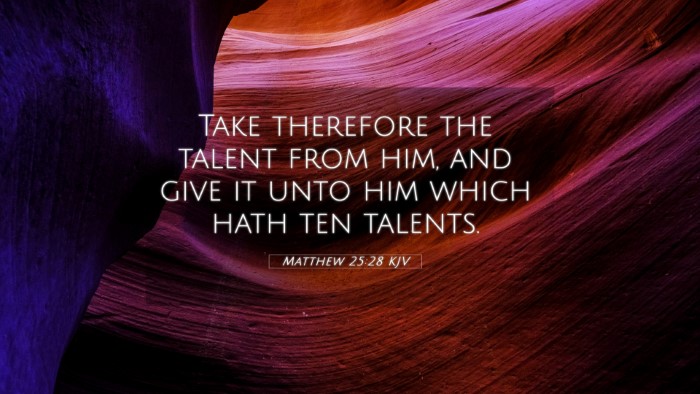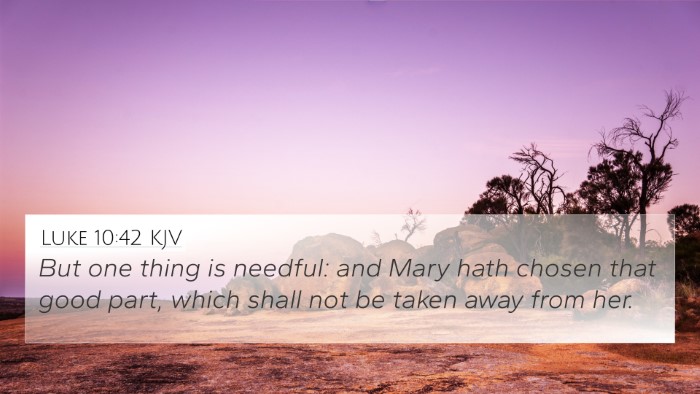Understanding Matthew 25:28
Verse Reference: Matthew 25:28
"Take therefore the talent from him, and give it unto him which hath ten talents."
Summary of Insights
This verse occurs at the conclusion of the Parable of the Talents, where the master rewards his faithful servants and punishes the one who did not utilize his talent. The meaning encapsulates themes of accountability, stewardship, and proper use of God-given gifts.
Thematic Analysis
The implications of this verse relate to the broader biblical themes of stewardship and responsibility in the use of our earthly resources and abilities.
1. Accountability
As Matthew Henry notes, the servant who hid his talent did not fulfill the Master's expectations and thus faced consequences. This highlights the importance of being accountable for our actions and gifts.
2. Stewardship
Albert Barnes emphasizes that we are stewards of the resources entrusted to us. Failing to utilize these wisely leads to loss. The essence of stewardship is active engagement and multiplication of what we have received.
3. Reward and Judgment
Adam Clarke points out that divine judgment is rooted in how we handle our responsibilities. The master’s decision to take away the talent signifies that God evaluates our service and returns accordingly.
Cross-References
This verse is intricately linked to several other Bible verses, enriching its interpretation:
- Matthew 25:14-30 - The Parable of the Talents as a whole.
- Luke 19:12-27 - The Parable of the Pounds, which conveys similar themes of stewardship with a different narrative.
- 1 Corinthians 4:2 - "Moreover it is required in stewards, that a man be found faithful."
- Romans 14:12 - "So then every one of us shall give account of himself to God."
- James 4:17 - "Therefore to him that knoweth to do good, and doeth it not, to him it is sin."
- Luke 12:48 - "For unto whomsoever much is given, of him shall be much required."
- Colossians 3:23-24 - "And whatsoever ye do, do it heartily, as to the Lord, and not unto men."
- Matthew 7:24-27 - The importance of putting the Lord's teachings into practice.
- Exodus 34:19 - Accountability as a theme from the Old Testament, referring to God's demands on His people.
- Galatians 6:7 - "For whatsoever a man soweth, that shall he also reap."
Applying Cross-Referencing Techniques
To further enhance your understanding, utilizing tools for Bible cross-referencing can provide deeper insights. A Bible concordance allows you to find themes and words across scripture, revealing connections between Bible verses.
How to Use Bible Cross-References
Begin by identifying key words or themes from Matthew 25:28 that resonate with other parts of scripture. Employ a cross-reference Bible study method to explore parallel verses, such as those mentioned above, linking similar themes across both the Old and New Testaments.
Conclusion
Matthew 25:28 serves not just as a lesson about the individual responsibility we bear in our spiritual lives but also emphasizes a broader landscape of thematic Bible verse connections. Each cross-referenced verse contributes to a comprehensive understanding of the biblical narrative on obedience, service, and divine recompense.
For those seeking to delve deeper into comparative Bible verse analysis or identify related Bible verses that support Matthew 25:28, this verse invites continual reflection on our own lives and how we utilize the resources entrusted to us.




